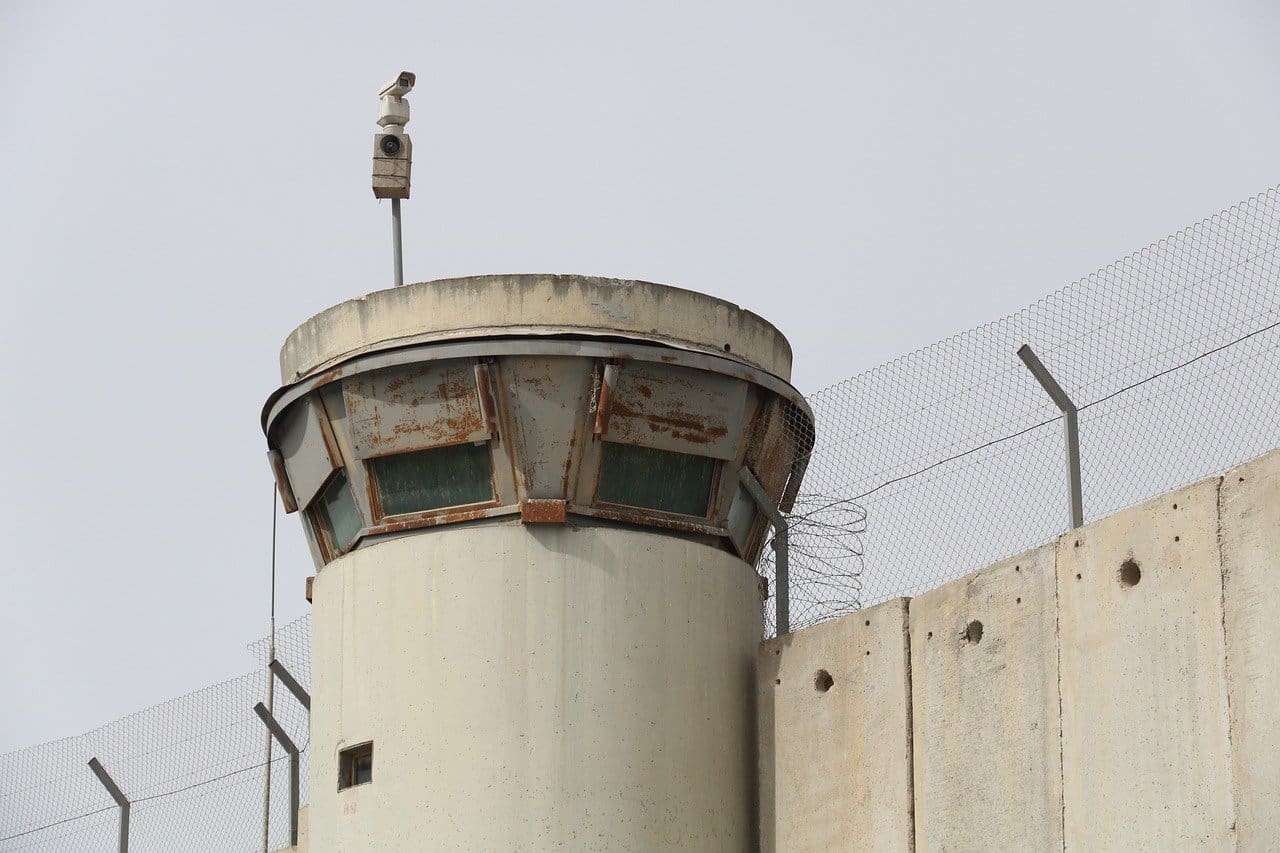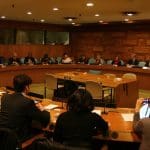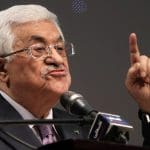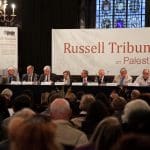
Overview
Palestinians have struggled against Israel’s Wall in the occupied West Bank and East Jerusalem for the past eight years. In July 2004, the International Court of Justice (ICJ) affirmed that the Wall and Israel’s occupation regime were in violation of international law. Al-Shabaka policy advisor Jamal Juma’, who has served as the coordinator of the Palestinian Grassroots Anti-Apartheid Wall Campaign since 2002, examines how and why the Wall was established, discusses the implications of the Court’s decision, and concludes with policy recommendations addressed to different sectors of Palestinian society and the international community.
What the Wall Has Done
Israel began constructing the Wall in June 2002 following its invasion of cities in the West Bank, which it dubbed “Operation Defensive Shield.” In retrospect, the invasion appears to have been a prelude to the construction of the Wall and no one recognized the significance of the invasion’s code name at the time. The immense scale of the 2002 invasion — characterized by the destruction of Palestinian civilian infrastructure, mass arrests, assassinations and massacres — ensured that the construction of the Wall would commence with as little resistance as possible.
Accompanied by hundreds of military checkpoints, the Wall solidified the dismemberment of the West Bank’s major population centers into Bantustans, separated from each other and segregated from occupied East Jerusalem. Israel’s actions were intended to enhance its control over the Palestinian people and block the establishment of a Palestinian state. The Wall intentionally blurs the “Green Line,” the internationally recognized armistice line between Israel and the occupied West Bank, thus over-riding international law and United Nations Security Council Resolutions relating to the Occupied Palestinian Territories (OPT). Instead of relying on international law, Israel has substituted negotiations over “disputed” territories for which it sets the terms under an American shield (See Mouin Rabbani’s policy brief).
Today, Israel’s “facts on the ground” clearly display the realities of its system of apartheid:
- The Wall, which will reach 810 km in length, isolates 46% of the occupied West Bank and divides it into three large cantons and 22 small Bantustans. It cements Israel’s control over 82-85% of Palestinian water resources in the OPT.
- A 1,400 km road network is dedicated exclusively to Israelis and separated from Palestinian roads by 48 tunnels.
- Thirty-four military checkpoints control the movement of people and goods between the different cantons and the movement of commercial traffic with Israel and the outside world.
- Industrial zones, agricultural areas and crafts workshops have been established along the Wall. These Israeli, joint, and international ventures aim to transform the Palestinian people into a cheap labor force dependent on the Israeli economy. Raw materials and exports are entirely Israeli while the capital is international, Israeli, and Palestinian.
Palestinian Civil Society’s Response
Grassroots and peaceful resistance against the Wall started three months after construction began. The delay was due in large part to the impact of the 2002 invasion on Palestinian society. Popular committees were formed in the villages and cities of the northern West Bank where the first stage of the Wall was under construction. Activists organized events, documented damages and violations, and organized international campaigns, communicating and coordinating with international solidarity activists who formed human shields at key areas around the West Bank. Dozens of rallies and activities were organized in the towns and villages across the northern and central West Bank. These protests occurred throughout the week and were coordinated with visits by international solidarity activists.
The demonstrations and other events attracted international attention. The images of the Wall and its route, which clearly showed the extent of Israel’s theft of vast agricultural lands and water resources as well as the immense environmental and agricultural destruction, shocked observers around the world.
However, the Palestinian Authority (PA) remained indifferent to these activities, angering many Palestinians. The PA’s silence was particularly glaring given the numerous letters and appeals by farmers, local councils, and popular committees for a response. Eventually, the indifference of the elected leadership raised questions and cast doubts among Palestinians and two rallies were organized outside the Prime Minister’s office to protest this stance.
Following the 2003 conference convened by the UN Committee on the Exercise of the Inalienable Rights of the Palestinian People in New York, the Grassroots Palestinian Anti-Apartheid Wall Campaign met with Nasser al-Qidwa, the Palestine Liberation Organization’s (PLO) permanent observer at the UN. The Grassroots Campaign provided al-Qidwa with a detailed power point presentation about the Wall and its consequences for the “peace process.” Al-Qidwa took action and coordinated with international organizations, seeking information from the committees, civil and formal institutions, and international institutions that monitored Israel’s violations in the OPT.
In December 2003, the UN General Assembly adopted a resolution to refer the case to the ICJ to seek its opinion about the legal consequences of Israel’s construction of the Wall. Prior to the February 14, 2004 ICJ meeting, peaceful popular marches across the occupied West Bank increased and were met with violence and repression by the Israeli army. Five Palestinians were killed and hundreds were wounded in the villages northwest of Jerusalem, specifically from Beit Duqqu and Biddu. In anticipation of the ICJ meeting, Israel altered the route of the Wall in Baqa al-Sharqiya in the Tulkarm Governorate and Beit Sourik and Qatana in the Jerusalem Governorate, restoring thousands of dunums of land it had previously confiscated (a dunum equals a 1,000 square meters). Meanwhile, the Israeli High Court issued a ruling stating that the army should take the “human impact” of the Wall on Palestinians into consideration.1
Before the ICJ was due to announce its ruling in July 2004, then member of the Israeli Knesset Dr. Azmi Bishara organized a sit-in in cooperation with the Grassroots Campaign. A tent was erected at the northern entrance to Jerusalem and stood for 10 days, attracting hundreds of solidarity delegations and popular committees from across historic Palestine as well as foreign and international organizations, diplomatic missions, and dozens of media outlets. The tent was packed with hundreds of people around the clock and lectures and presentations were organized. However, the PA abruptly and violently shut down the tent. The PA claimed that the tent was no longer needed after the ICJ passed its ruling on July 9, 2004. In reality, the tent was becoming a source of embarrassment to the PA because it was attracting attention in the media and the public.
The ICJ Opinion and its Implications
The ICJ’s advisory opinion was a great boost to the Palestinian people, particularly those living in the villages, cities and communities closest to the path of the Wall.4
The ICJ also found – by a vote of 13-2 – that the international community was obliged not to recognize the situation resulting from the construction of the Wall or to provide assistance to maintaining the status quo. It is interesting to recall that a similar conclusion over three decades ago with regard to South Africa’s occupation of South West Africa led to sanctions against the apartheid state.
In addition, the court called for all parties to the Fourth Geneva Convention to compel Israel to implement its decision and reaffirmed the applicability of the Geneva Conventions to the OPT. By a vote of 14-1, the ICJ called on the UN to “consider what further action is required to bring to an end the illegal situation resulting from the construction of the Wall and the associated régime.”
After it was referred to the UN, an overwhelming majority of members of the UN General Assembly endorsed the ICJ’s opinion. However, over six years later, the UN Security Council has yet to review the advisory opinion.
The advisory opinion has had implications at both the official and popular levels. In spite of the victory at the ICJ, PA officials have deliberately disregarded the advisory opinion. Each year they justify their negligence by maintaining that the political circumstances are unfavorable and that the Europeans and the Americans would not support their request to resort to the UN Security Council. While it is evident that there is considerable pressure from Israel and the U.S., the PA has not utilized the advisory opinion as an effective bargaining chip. Instead of relying on international law it has continued to bet on the negotiations sponsored by successive American administrations. Thus, the PA is caught in a vicious cycle: The very negotiations that they rely on for international recognition are used by the U.S. and Israel to pressure them to abandon Palestinian rights.
The PA’s approach has had implications internationally. Because it represents the “official” Palestinian position, no nation – however friendly to the Palestinian people – is able to advocate forcefully on behalf of the Palestinians or its leadership. In other words, they cannot be “more Palestinian than the Palestinians.”
By contrast, the popular position has been and remains well ahead of the official position. From the earliest days of the Wall’s construction, the Palestinian public recognized it as a colonial and racist project aimed at imposing a new geopolitical and security reality on the ground that would dramatically alter the West Bank and tighten Israel’s grip. Therefore, the strategy underpinning popular action was based on resisting Israel’s goals on the ground, creating broad international support with solidarity movements, and demanding the enforcement of international law and resolutions.
That popular resistance soon included moves toward boycotting Israel. Since 2003, civil society activists, including the Grassroots Campaign and the Palestinian Campaign for the Academic and Cultural Boycott of Israel have worked for an international boycott against Israel. The ICJ’s advisory opinion not only reinforced the Palestinian boycott efforts but also enabled Palestinian Civil Society to continue pressuring the PA to challenge Israel in international forums. Moreover, international solidarity movements began to base their demands for dismantling the Wall and settlements and ending the occupation on the ICJ’s advisory opinion.
On the first anniversary of the ICJ opinion the Palestinian Call for Boycott, Divestment and Sanctions (BDS) was launched by 171 Palestinian coalitions, associations, trade unions, and organizations within and outside historic Palestine. This Call, which is the first Palestinian consensus document since the founding of the PLO, seeks to boycott and impose sanctions against Israel to ensure its compliance with international law. Over the past five years, the BDS movement has grown in size and strength around the world and has become the international reference point for all solidarity initiatives and movements globally (See Omar Barghouti’s policy brief). The BDS call has been followed by subsequent declarations such as the 2009 Kairos Document issued by a coalition of Palestinian churches that called on churches around the world to boycott Israel.5 Moreover, these actions by Palestinian civil society were welcomed by international solidarity groups who were eager for a non-official Palestinian grassroots initiative.
The popular resistance embodied by the BDS movement and the weekly protests against the Wall are the foundation upon which international solidarity is built. These grassroots efforts have pushed the confrontation with Israel’s occupation to a vital battleground: the international arena with its media, civil and official institutions, organizations, trade unions, activists, universities, and even the private sector. The impact and implications of these efforts has not gone unnoticed. A recent report by the Reut Institute, an Israeli think-tank, argued that BDS represented a strategic threat to Israel.6
Recommendations
These recommendations stem from the experience of the past eight years of struggle against the Wall.
- The PA must end its compliance with U.S. dictates and fully engage in the international battle against Israel as an occupying state, demanding that the UN Security Council and General Assembly implement the ICJ’s advisory opinion as well as other relevant resolutions.
- Greater coordination and organization of the BDS movement is needed internationally in order to maintain pressure on Israel.
- Within the Arab world, it is crucial to revive the Arab Boycott Committee, bringing more Arab grassroots organizations and unions on board with the BDS movement and pressuring the Arab League to withdraw its support for negotiations until the ICJ ruling is implemented in full.
- Grassroots resistance needs to be expanded to include all contact points along the Wall and alongside Israeli settlements. At the same time all forms of formal and popular normalization must be stopped.
- The Palestinian citizens of Israel must resort to international judicial means to end the racism and discrimination they have been suffering for more than six decades.
This is the way to end Israel’s occupation, dismantle the Wall and destroy the deep-seated racist mentality of Israel’s leaders. This is the way to make Israel recognize that it is part of rather than above the international community.
- John Sigler, “The Israeli High Court of Justice and the Apartheid Wall,” The Electronic Intifada, 15 July 2004, http://electronicintifada.net/v2/article2916.shtml.
- For an accessible discussion of the ICJ opinion, see “Legal Analysis and Potential Consequences,” by Susan Akram, Associate Professor, Boston University Law School and John Quigley, Professor, Ohio State University School of Law, published by the DC-based Palestine Center in September 2004.2 By a vote of 14 – 1, the ICJ found that Israel’s Wall and associated regime were illegal and said that the Wall had to be dismantled and reparations paid to Palestinians whose property was damaged by its construction.3The dissenting judge on this and four other points made clear that he shared the Court’s conclusion that international law applied to the occupied Palestinian territories and must be complied with by Israel. His differences with the majority were on the basis that the Court should not have rendered an opinion without a fuller consideration of Israel’s security concerns.
- See http://www.kairospalestine.ps/
- Ali Abunimah “Israel’s new strategy: “sabotage” and “attack” the global justice movement,” The Electronic Intifada, 16 February 2010 http://electronicintifada.net/v2/article11080.shtml
Jamal Juma’ is the Coordinator of the Palestinian grassroots Anti-Apartheid Wall Campaign (Stop the Wall), a secretariat member of the BDS National Committee (BNC), and an executive committee member of the New Unions.













